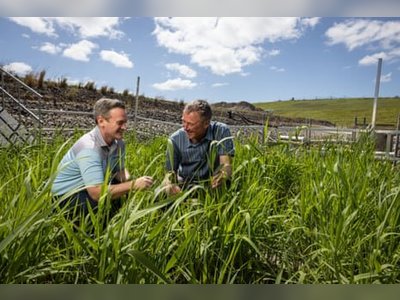
Australia's Refugee Resettlement Program Becomes Permanent
The Community Refugee Integration and Settlement Pilot is set to continue, expanding support for refugee families in Australia.
The Australian federal government has announced that the Community Refugee Integration and Settlement Pilot (CRISP) will become a permanent part of the country’s humanitarian resettlement program.
Initially launched in mid-2022 as a three-year initiative, CRISP connects local community groups with refugee families nominated by the United Nations refugee agency, offering them crucial support for the first twelve months of their resettlement in Australia.
One of the beneficiaries of this program is Juan Santamaria, a former criminal lawyer who fled Venezuela in search of safety.
Arriving in Australia in 2023, Mr. Santamaria received assistance from local community groups in various aspects of settling into his new life, including registering for Medicare and finding accommodation.
He expressed gratitude for the support he received, emphasizing how vital it was for individuals arriving alone in a new country.
During his time in the program, Mr. Santamaria was connected with a Jewish community group, through which he formed lasting friendships, notably with a member named Guy Abrahams.
Federal Assistant Minister for Citizenship and Multicultural Affairs Julian Hill described the CRISP program as both cost-effective and beneficial.
In his remarks, he noted the positive feedback from communities across Australia and highlighted the transformative impact the program has had on the lives of refugees.
Minister Hill conveyed the rewarding experiences shared by volunteers from various states and territories involved in welcoming newcomers to the country.
Initially set to conclude in June 2025, the pilot program received an additional $1 million in funding, enabling its extension until June 2026. However, the government has now taken steps to make CRISP a permanent fixture within Australia's broader humanitarian framework, allowing for ongoing support and planning for future refugee arrivals.
Lisa Button, the chief executive of Community Refugee Sponsorship Australia, which coordinates the CRISP program, expressed aspirations to expand its capacity as it transitions to a permanent program.
She mentioned that while the current scale of CRISP is modest, there are significant ambitions for the program moving forward, particularly since its efficacy has been demonstrated.
According to Ms. Button, there is a considerable interest from Australians wishing to engage with the program, and future efforts will explore how this model can address various humanitarian crises, including those from the evacuations in Afghanistan, arrivals from Ukraine, and ongoing situations in Gaza.
Initially launched in mid-2022 as a three-year initiative, CRISP connects local community groups with refugee families nominated by the United Nations refugee agency, offering them crucial support for the first twelve months of their resettlement in Australia.
One of the beneficiaries of this program is Juan Santamaria, a former criminal lawyer who fled Venezuela in search of safety.
Arriving in Australia in 2023, Mr. Santamaria received assistance from local community groups in various aspects of settling into his new life, including registering for Medicare and finding accommodation.
He expressed gratitude for the support he received, emphasizing how vital it was for individuals arriving alone in a new country.
During his time in the program, Mr. Santamaria was connected with a Jewish community group, through which he formed lasting friendships, notably with a member named Guy Abrahams.
Federal Assistant Minister for Citizenship and Multicultural Affairs Julian Hill described the CRISP program as both cost-effective and beneficial.
In his remarks, he noted the positive feedback from communities across Australia and highlighted the transformative impact the program has had on the lives of refugees.
Minister Hill conveyed the rewarding experiences shared by volunteers from various states and territories involved in welcoming newcomers to the country.
Initially set to conclude in June 2025, the pilot program received an additional $1 million in funding, enabling its extension until June 2026. However, the government has now taken steps to make CRISP a permanent fixture within Australia's broader humanitarian framework, allowing for ongoing support and planning for future refugee arrivals.
Lisa Button, the chief executive of Community Refugee Sponsorship Australia, which coordinates the CRISP program, expressed aspirations to expand its capacity as it transitions to a permanent program.
She mentioned that while the current scale of CRISP is modest, there are significant ambitions for the program moving forward, particularly since its efficacy has been demonstrated.
According to Ms. Button, there is a considerable interest from Australians wishing to engage with the program, and future efforts will explore how this model can address various humanitarian crises, including those from the evacuations in Afghanistan, arrivals from Ukraine, and ongoing situations in Gaza.
AI Disclaimer: An advanced artificial intelligence (AI) system generated the content of this page on its own. This innovative technology conducts extensive research from a variety of reliable sources, performs rigorous fact-checking and verification, cleans up and balances biased or manipulated content, and presents a minimal factual summary that is just enough yet essential for you to function as an informed and educated citizen. Please keep in mind, however, that this system is an evolving technology, and as a result, the article may contain accidental inaccuracies or errors. We urge you to help us improve our site by reporting any inaccuracies you find using the "Contact Us" link at the bottom of this page. Your helpful feedback helps us improve our system and deliver more precise content. When you find an article of interest here, please look for the full and extensive coverage of this topic in traditional news sources, as they are written by professional journalists that we try to support, not replace. We appreciate your understanding and assistance.











